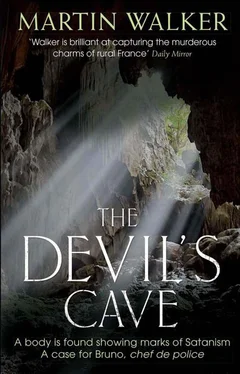Martin Walker - The Devil's Cave
Здесь есть возможность читать онлайн «Martin Walker - The Devil's Cave» весь текст электронной книги совершенно бесплатно (целиком полную версию без сокращений). В некоторых случаях можно слушать аудио, скачать через торрент в формате fb2 и присутствует краткое содержание. Год выпуска: 0101, Издательство: Quercus, Жанр: Полицейский детектив, на английском языке. Описание произведения, (предисловие) а так же отзывы посетителей доступны на портале библиотеки ЛибКат.
- Название:The Devil's Cave
- Автор:
- Издательство:Quercus
- Жанр:
- Год:0101
- ISBN:нет данных
- Рейтинг книги:4 / 5. Голосов: 1
-
Избранное:Добавить в избранное
- Отзывы:
-
Ваша оценка:
- 80
- 1
- 2
- 3
- 4
- 5
The Devil's Cave: краткое содержание, описание и аннотация
Предлагаем к чтению аннотацию, описание, краткое содержание или предисловие (зависит от того, что написал сам автор книги «The Devil's Cave»). Если вы не нашли необходимую информацию о книге — напишите в комментариях, мы постараемся отыскать её.
The Devil's Cave — читать онлайн бесплатно полную книгу (весь текст) целиком
Ниже представлен текст книги, разбитый по страницам. Система сохранения места последней прочитанной страницы, позволяет с удобством читать онлайн бесплатно книгу «The Devil's Cave», без необходимости каждый раз заново искать на чём Вы остановились. Поставьте закладку, и сможете в любой момент перейти на страницу, на которой закончили чтение.
Интервал:
Закладка:
‘All very public-spirited,’ said Bruno, as he handed back the petition and fell into step beside Lemontin. ‘But you didn’t put in the bit about it spoiling your view and maybe shaving a bit off the profit you’ve already made on that house of yours. Isn’t that what this is about? I’ve never known you to attend any other demonstration in these parts.’
‘Well, what if I do have a personal interest?’ Lemontin replied, a faint blush spreading on his cheeks. ‘I’m entitled to make my point, just like any other citizen. And those arguments are real — there hasn’t been an environmental assessment but the Mayor is hell-bent on pushing this through. I’m told that he’s already granted preliminary approval without any public discussion and without the council even seeing the plans. And the more I look into it, the more I smell something fishy in this investment house that’s behind it.’
‘I thought it was some big reputable firm in Paris,’ Bruno said. Now they were almost at the Mairie .
‘That’s what they say, but when you look into the real owners you get into a maze of finance companies in Luxembourg and investment trusts in Switzerland and offshore places like the Cayman Islands. There’s even a Lebanese connection.’
It all sounded a bit too sophisticated for St Denis, Bruno thought. ‘Well, all this can be sorted out at the next council hearing. Have you got any councillors on your side?’
‘Only Alphonse,’ Lemontin said glumly. Alphonse was the local Green, an elderly hippy who had come to establish a commune in the hills above the town at the end of the Sixties. ‘I know, he’ll support anything. Or oppose anything, more likely. I can’t say I’ve ever voted for him and I’m not sure I would even now.’
‘He’ll still be listened to,’ Bruno replied, noting that Alphonse hadn’t bothered to turn up for the demonstration. ‘Besides, a lot of people think highly of Alphonse, and I’m one of them. Do you want me to take that petition inside for you?’
‘No, I want to put it into the Mayor’s hands, but then I have to get back to the bank. I’m on an early lunch break.’
4
The Junot farmhouse had one of the best views in the valley, a privilege it paid for with thin, infertile soil and by suffering the chill winds that swept the high plateau in winter. Built in the boom time of the 1880s when the new wonder crop of tobacco had brought prosperity to the Perigord and a sharp rise in the population, it had seldom prospered since. Sheep and goats were the only livestock that could thrive on the tussocks, thorns and bracken. Generations of Junots had hauled up topsoil from the valley to build a sheltered vegetable garden to feed the family on turnips, beans and potatoes. A very modest living could be scratched from the place with hard work and determination. Louis Junot seemed capable of neither.
Bruno paused at the crest of the hill, looking at the tiles that had fallen from the farmhouse roof and not been replaced, at the broken fencing and the weeds in the garden. More weeds choked the half-dozen rows of spindly vines, and Bruno winced at the thought of the sour wine that Junot would be making. It was probably all he could afford. There was hardly any chopped wood left on the terrace. Any decent farmer up in these hills would have at least another winter’s worth of firewood in hand. The ducks and chickens looked healthy enough, but they were traditionally the responsibility of the farmer’s wife and the source of her pin money.
His problem, however, was the husband. Louis Junot was known to drink, and was no doubt capable of violence, but so far the only justification for his arrest was an anonymous letter, which was not enough. Without a complaint from his wife, Bruno had few options. Before coming he had checked the list he kept in the office of those who’d paid for that year’s hunting permit. Junot’s name was not on it, so any evidence of hunting — even for rabbits — would justify Bruno in making an arrest. That would be a last resort and the Mayor had asked him to be discreet. His first task was to assess whether the beating was happening; the second to see if the wife would testify; the third to issue a warning. It was one of those tricky moments of policing when Bruno had few cards to play.
Bruno heard the sound of hammering and a curse from the barn below the house. He saw a curtain twitch at the window by the door to the house. Junot’s wife had seen him coming, but she took her time answering the door and opened it just a crack. She knew him from open days at the tennis club, watching her young daughter play and mixing with the rest of the mothers as their children attacked the refreshments afterwards. But still she eyed him with suspicion as he removed his hat, smiled and asked if he could come in.
‘What for?’
‘I have some questions I have to ask you.’
‘What do you mean, questions?’ She had opened the door a fraction wider and he saw a bruised cheek and a black eye.
‘Questions about a written complaint we’ve received,’ Bruno said. ‘Either I come in and ask you about them or we’ll have to take you and your husband to the Gendarmerie.’
It was not a threat he liked to make, but he had to. All anonymous letters were supposed to be filed, and the Inspectorate of Police had the right to read them and demand why a case had not been pursued. Wife-beating had become a prominent issue and Bruno could be in trouble if the Inspectors thought he were ignoring complaints.
‘I’ll get Louis,’ she said, opening the door with reluctance.
‘It’s you I need to speak to first,’ he said, stepping briskly inside in a way that made Madame Junot step back. As she moved, she lifted her hand to her side, as if her ribs hurt.
‘You’ve been hurt, Madame. What happened?’ He cast an eye around the big kitchen with its stone floor that would be bitterly cold in winter and an original stone sink. There were no taps. Water would have to be pumped up daily from the well outside. The only modern amenities were an electric light bulb hanging from the ceiling and an elderly cooking stove fuelled by bottles of gas.
‘I fell down the stairs.’
‘The stairs did not blacken your eye. What caused that?’
She did not answer, but turned back to the stove where a large pot was simmering. She lifted the lid, releasing a scent of duck stock and of garlic, broke two small eggs into the soup and began to stir with an age-blackened wooden spoon.
‘Making tourain ?’ Bruno asked, noticing the bowl filled with evidently stale bread she had placed beside the stove. A classic dish of the Perigord, it was the traditional cheap but filling lunch of the farmers, and simple to make. Based on the stock from the carcass of a duck, some garlic and salt, stale bread and an egg or two, it could be thinned out with water or milk or thickened with more bread or vermicelli. And when the bowl of soup was almost finished, any true Perigourdin would make chabrol , pouring in half a glass of red wine to swirl it around the plate, and then lift the bowl to his lips.
She shrugged, keeping her back to him. She was wearing a wrap-around apron, washed so often that the floral print had faded almost beyond recognition. Underneath she wore sagging woollen stockings and a long pullover that she had knitted herself with wool from their own sheep. There was no sign of a TV, far less a computer. A shelf on the wall opposite the window carried an elderly radio, what looked like a bible, a farmer’s almanac and a battered cookbook. There were no other books in sight, no newspapers or magazines. What a strange childhood Francette must have known, Bruno thought. How could she hope to fit in with school classmates who’d talk of the latest TV shows and pop songs?
Читать дальшеИнтервал:
Закладка:
Похожие книги на «The Devil's Cave»
Представляем Вашему вниманию похожие книги на «The Devil's Cave» списком для выбора. Мы отобрали схожую по названию и смыслу литературу в надежде предоставить читателям больше вариантов отыскать новые, интересные, ещё непрочитанные произведения.
Обсуждение, отзывы о книге «The Devil's Cave» и просто собственные мнения читателей. Оставьте ваши комментарии, напишите, что Вы думаете о произведении, его смысле или главных героях. Укажите что конкретно понравилось, а что нет, и почему Вы так считаете.












